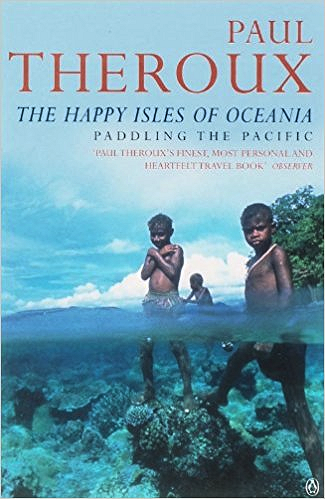 This is one of Theroux’s odder travel books. The spectre of separation from his wife haunts the narrative as the veteran travel writer sets off to paddle the Pacific. Not, mercifully, in a Thor Heyerdahl non-stop-adventure kind of a way, but in a more relaxed pottering-around-the-islands sort of way.
This is one of Theroux’s odder travel books. The spectre of separation from his wife haunts the narrative as the veteran travel writer sets off to paddle the Pacific. Not, mercifully, in a Thor Heyerdahl non-stop-adventure kind of a way, but in a more relaxed pottering-around-the-islands sort of way.
It is a difficult book to get to grips with, partly because Theroux’s trip has no real structure and thus becomes a series of discrete adventures on each new set of islands. He does talk quite a bit about the cultural connections (or lack of them) between the Happy Isles, and goes out of his way to rubbish Heyerdahl’s theory that South American Indians paddled their way across the ocean to populate the islands. He also emphasises that almost all scholars of the region agree that this is nonsense.
As usual with Theroux, there is plenty of insight in the book and enough good characters to keep it interesting. However, it does become a little repetitive at times – not really his fault, just a result of the type of trip he is doing.
Theroux has clearly struggled to strike a balance between allowing his fractured marriage to be an issue in the book, and choosing not to make it the centrepiece, nor an excuse for what at times seems to be little more than an escape. This might be irritating for readers who are given glimpses into his personal life only for the door to be firmly shut for another hundred pages; but ultimately I feel that Theroux has earned the right to write how he sees fit.
There are of course trip highlights, which I won’t spoil, although it is not a riveting read in the way that Dark Star Safari or The Great Railway Bazaar might be. Nevertheless it has a gentle, calming effect on the reader who gets carried along the waves much as Theroux drifts and paddles his way along.
Perhaps the most interesting idea in the book is the relationship between islanders and the sea. Visitors – especially those who have romanticized the region, the artist Paul Gaugin being perhaps the most obvious example – tend to focus on the ocean as the heart of the region. Native islanders it turns out are often not great seafarers, many never venturing onto the waves unless it’s to catch some fish, or to catch the ferry to the next island. They are often are insular in the true sense of the word – inward looking, as well as physically isolated.
heroux does not attempt to collapse the region as he collapses his kayak. There are important cultural and political differences between groups of islands – often related to their colonial heritage – but nevertheless, with the exception of the exceptionally remote Easter Island, and the equally remote but remarkably wealthy Hawaii – there are commonalities to these jewels strung out across the Pacific, and this common thread loosely holds the book together.
Overall verdict: Worth persevering with, but not up to his usual high standard.
Penguin, 1993
